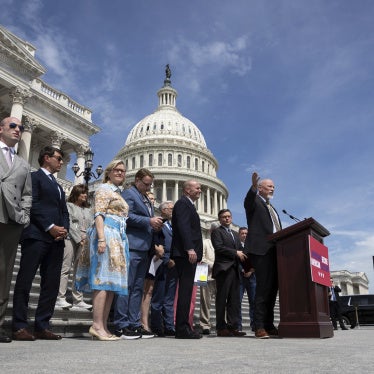Human Rights Watch highlighted 31 specific steps that President-elect George W. Bush should take to improve human rights in the United States and the world.
"Support for human rights in the world is firmly in the U.S. national interest and directly reflects the nation's highest ideals," wrote Kenneth Roth, Executive Director of Human Rights Watch. "Governments that resort to abuses to maintain their rule make unreliable partners for the United States."
Among the recommendations of Human Rights Watch:
-- press for the arrest of the top figures indicted for war crimes in the Balkans, including former Yugoslav President Slobodan Milosevic, and Bosnian Serb leaders Radovan Karadzic, and Ratko Mladic. The impunity enjoyed by the architects of the Balkan wars could give hope to nationalists who seek to undermine reconciliation and reform.
-- condition any further aid to Colombia's armed forces on strict respect for human rights. Colombia has failed to meet a single human rights condition required by the last year's $1.3 billion aid package, but President Clinton has waived these conditions and gone ahead with the aid.
-- use "sustained political pressure" on China to improve its human rights situation. Dialogue, trade, and investment in China do not automatically guarantee human rights improvements when China is restricting internet access, imprisoning peaceful dissidents, and making only limited efforts at legal reforms.
-- condition federal aid to U.S. police and corrections departments on improvements in curbing brutality and to support inquiries by the Department of Justice into police departments which have tolerated patterns of abuse.
-- maintain the restrictions on the recruitment of human rights abusers by U.S. intelligence agencies. A congressional panel recently recommended loosening those restrictions, although recent years have seen several embarrassing revelations that foreign officials responsible for murder, torture, and "disappearance," have been on the CIA payroll.
Human Rights Watch noted that the apparent assassination of President Laurent Kabila of the Democratic Republic of Congo underscored the volatility of that African giant wracked by a civil war which involves six other countries. As successive waves of atrocities have gone unpunished, the group asserted, all sides in that war have acted against civilians with increasing licence. It called for a United Nations Commission of inquiry into abuses there. "The mere act of deploying such a team on the ground could save lives, and would send a message that the world is determined not to let atrocities be committed in obscurity," wrote Roth.
The group especially pressed the incoming president to act against injustices in the United States. "The United States cannot effectively champion human rights abroad if it ignores them at home," said the letter. Seven of the 31 recommendations focused on human rights abuses in the United States.







